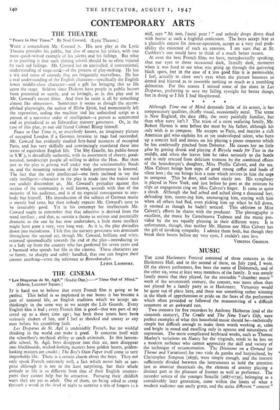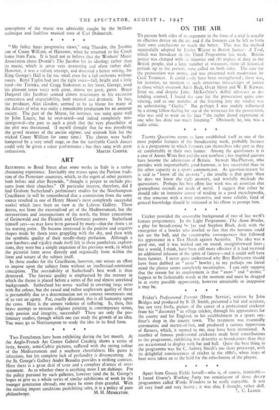MUSIC
THE 22nd Haslemere Festival consisted of three concerts in the Haslemere Hall, and to the second of these, on July 23rd, I went. Of the eleven performers, five bore the name of Dolmetsch, and of the other six, some at least were members of the family. It was mostly family music that they played, for the ensemble "chamber music" work of the seventeenth century, the consort, was more often than not played by a family party as at Haslemere. Virtuosity would be quite out of place here, and there was something rather winning in the blush of apprehension or pride on the faces of the performers which often preceded or followed the manoeuvring of a difficult ornament or an awkward run.
Two consorts for five recorders by Anthony Holbome (end of the sixteenth century), The Cradle and The New Year's Gift, were perfect examples of what this household music should be—technically simple but difficult enough to make them worth working at, calm and bright in mood and excelling only in aptness and naturalness of expression. The more complicated keyboard works, such as Thomas Morley's variations on Nancy for the virginals, tends to be lost on a modern audience who cannot ,appreciate the skill and variety of the technique of ornamentation. The Divisions on a Ground (or Theme and Variations) for two viole da gamba and harpsichord, by Christopher Simpson (1659), were simple enough, and the interest sufficiently divided between the instruments to hold the attention just as amateur theatricals do, the element of anxiety playing a distinct part in the pleasure of listener as well as performer. The recorder sonata of the younger Senaille (1687-173o), belonging to a considerably later generation, came within the limits of what a modern audience can easily grasp, and the quite different " concert "
atmosphere of the music was admirably caught by the brilliant technique and faultless musical taste of Carl Dolmetsch.
* *
" My father hates progressive views," sang Theodor, the Jacobin son of Count William, of Harrasov, when he returned to his Czech home from Pads. It is hard not to believe that the Workers' Music Association chose Dvorak's The 7acobin for its ideology rather than its music, which is never very interesting and often rather dull. However, it was a valiant attempt, and deserved a better setting, for King George's Hall is far too small even for a full orchestra without voices. Beryl Taplin had just the right voice—full, bright and a little hard—for Terinka, and Cragg Sinkinson as her lover, George, used his pleasant tenor voice with great, almost too great, gusto. Bruce Dargavel (the Jacobin) seemed almost reactionary in his excessive correctness and respectability, both musical and dramatic. In fact, the producer, Alan Gordon, seemed to be to blame for many of the defects of what was realty a remarkable production for an amateur society. The part of the Mayor, for instance, was sung quite well by John Laurie, but he over-acted--and indeed completely mis- interpreted—the part to such a pitch that the very plausibility of the plot was threatened. (I myself thought that he was parodying the grand manner of the ancien regime, and mistook him for the wicked Count William for some time.) The chorus were badly hampered by a very small stage, so that the inevitable Czech dances could only be given a token performance ; but they sang with great



































 Previous page
Previous page